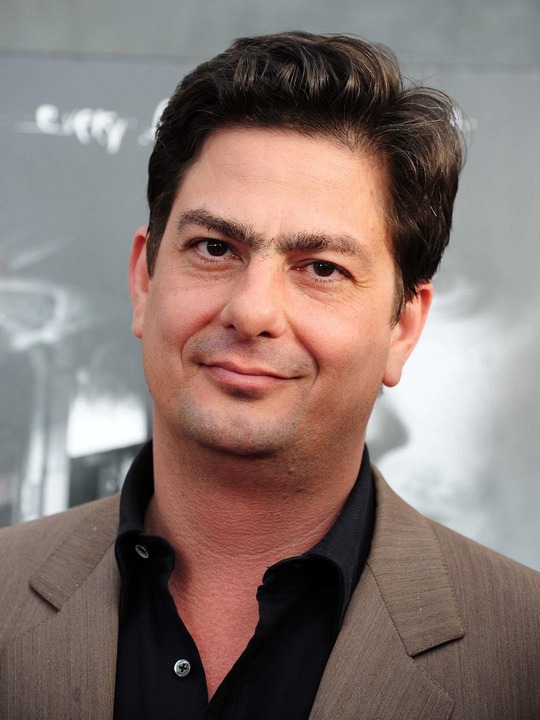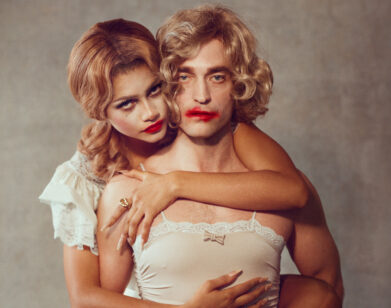Roman Coppola is Young at Heart

In attendance at Cannes in 1979 for a work-in-progress and, in effect, rescue screening of Apocalypse Now, was the entire Coppola clan. A windswept family vacation photograph can be found floating around the Internet—mini-Sofia in jean suspenders, front and center. At the far right is a teenaged Roman Coppola, who returned to Cannes in 2001 with his feature-debut, CQ, and again this year with two projects: as producer of Walter Salles’s much-anticipated adaptation of On the Road (to which is father bought the rights 30 years ago) and as co-writer of Wes Anderson‘s Moonrise Kingdom, which premiered opening night of the festival.
Founder of the production company The Director’s Bureau, and co-owner of American Zoetrope, Coppola has directed numerous ads and music videos, all of which call upon his Rube Goldberg yen for imagining function, fantasy, and humor in a bubble. Take, for instance, his video for Daft Punk’s “Revolution 909,” which transforms a police raid of a rave into an instructional video on how to make tomato sauce. Or his Stella Artois ad, in which a girl gets swallowed by her date’s gadget-y, Bond bad guy lair.
With Moonrise Kingdom, Coppola reunites with Anderson, moving away from Darjeeling‘s grumbling family woes, focusing instead on the innocence and escape of first-time love. Set in the summer of 1965 on an island in New England, the film stars newcomers Kara Hayward and Justin Gilman as Suzy and Sam, two 12-year-olds whose plan to run away together is thwarted by a storm, clueless parents (Bill Murray, Frances McDormand) and doltish yet earnest authorities (Bruce Willis, Ed Norton, Tilda Swinton).
We spoke to Coppola about Moonrise, writing with Anderson, and his decade-later follow-up to CQ, A Glimpse Inside the Mind of Charles Swan III.
ROMAN COPPOLA: Hello!
DURGA CHEW-BOSE: Hi Roman, how are you?
COPPOLA: I’m good. How’re you doing? Where are you?
CHEW-BOSE: In New York. And you’re in LA? Back from Cannes?
COPPOLA: I’m actually in Paris. I’m still here. I didn’t bother to come back. It’s so nice here.
CHEW-BOSE: This is the second time you’ve co-written a feature with Wes Anderson—what does your writing process look like? And how was Darjeeling different than Moonrise?
COPPOLA: It’s interesting because they were quite different. Darjeeling was something that Jason [Schwartzman] and I, and Wes, from the very beginning…Well, look. Actually, Wes had written the first two or three pages, which is the Bill Murray character racing to the airport, and it was kind of exciting, you know. You read those pages and you’re like, “Okay, here we are. Go!” And then we took it from there. We sort of assumed each role of each brother. I was the middle brother. Jason was the younger brother. Wes was the elder brother. And the process of writing was basically inviting things to happen. We went on long walks, we went to India, rode a train, and we would kind of stumble into people’s homes, and just really invited experiences to happen that became the scenes. We would act them out, and in the evening we would remember what we said. So that project, by contrast, was quite a long process, with a lot of us assuming these characters. Wes is the director, duh!, and as the director, we the writers are in service of him. We’re working for him. The director is the ultimate creative arbiter of what’s going to happen. And as a director myself, you really appreciate collaborating with people who are trying to help you find what you need and what you want. It was my pleasure to be that kind of support. So in the writing process, he could kind of hold the pencil. And that’s sort of the way he works. And I presume with other collaborators, like Owen, it’s the same.
CHEW-BOSE: And with Moonrise?
COPPOLA: Now with Moonrise, it was quite different, in that he had imaged a movie set on an island with kids running away and falling in love—it was something he had pondered before Darjeeling. Anyway, he started to work on it on his own and just as friends we would chat. I would see how it was going, and over some time he sent me around ten pages and after that, I started to ask, “What’s next?” And he was not clear—he was stuck. He was frustrated, and I was frustrated, because I was like the audience wanting to know. Anyway, then he and I happened to be together, and very innocently, not as a writer but as a friend I would start asking questions like, “Who is this kid? What do his parents think when he runs off like this?” And Wes answered, “Well, I don’t know if he has parents. I think he’s an orphan.” So just really by asking questions and being interested, ultimately I became more of a sounding board. In the course of three or four weeks, it went from this 10-page document with a lot of thought and gestation of ideas in the world into a whole script. We had this very free-flowing banter that helped just lift it out. That was my role. To help him find this thing that was there.
CHEW-BOSE: It sort of sounds like when as a kid, an adult is making up a story on the fly, say at bedtime, and you have so many intricate questions about plot—the who, the what, and usually, the why?
COPPOLA: Yeah, absolutely. It was very sincere. I really wanted to know. It was fun. We just started to click and then he invited me to be more formally involved.
CHEW-BOSE: Were the characters of Sam and Suzy based on you two as kids or friends or family from childhood?
COPPOLA: You know, a few things here or there. It’s true with Darjeeling as well. A lot of the writing is just kind of chatting. But specifically in Moonrise, in the fourth grade there was a girl who I was in love with, basically, and one day she gave me a note that said, “I think you’re cute. Call me.” It was a very epic feeling to receive that.
CHEW-BOSE: Did you call her?
COPPOLA: I did. And it was like, “Hi.” And she said, “Oh, hi.” And I said, “You said I should call you.” And she said, “Yeah, okay. Well, see you at school tomorrow.” It was very awkward and nothing happened. But that little image and feeling appears in the movie when Suzy gets on the bus and the note is exchanged. And in a way, in my life and I think also in Wes’, you know, we never had that epic adventure of running off with a girl, and sleeping in a tent. But you would daydream about that. That’s what you wished would have happened. So it was kind of a memory of a fantasy.
CHEW-BOSE: The many hats you wear, not just as director of films, but of music videos, and producer, and inventor, and your fascination with magic, lends itself to creating this nostalgic yet controlled sense of fantasy. When writing Moonrise, how much visual detail did you and Wes write in the script?
COPPOLA: Right, right. Well it’s a good question. When writing it, it’s true that the dialogue kind of drives the whole thing but there are situations or say, that Sam gets struck by lightning, or any event that occurs that would be exciting, or that involves imagery. Wes is of course famous for seeing the world in a very particular way. So it would be rare for me to say, “Oh wow, you could have a shot of this, or a close-up of that.” We don’t really talk about the filmmaking of it. But we do talk about the impact of images.
CHEW-BOSE: I read that, along with other future projects, you’re working on a Bugsy Malone-type film. Could you talk about that project a little, and also, your draw towards characters that are in effect children with adult bents?
COPPOLA: I’m not quite ready to talk about that project yet, I’d rather save it, but the notion is, as with Bugsy Malone, that it’s not really written for kids, but portrayed by kids. So yeah I do think that’s true with the kids in Moonrise. It isn’t about making it believable, they’re just two people, of course Sam talks about bedwetting. But it’s not conscience, like, “How do you make this work for kids.” You just follow your intuition and hope that you get the right tone.
CHEW-BOSE: I especially thought the exchanges between Sam and Suzy, when they are alone, feel like two people with this kind of matter-of-fact sense of self that could either stem from years of life and experience or complete newness to everything. Like how Suzy forgets to pack her brush, but knows she can simply comb out the knots with her hands. That felt very real and exact.
COPPOLA: Right, right, I’m glad that you appreciated that. It felt like a true moment. It felt honest.
CHEW-BOSE: What are some of your favorite movies with kid protagonists?
COPPOLA: I love Chitty Chitty Bang Bang and I love Bugsy Malone. I haven’t seen Bedknobs and Broomsticks in a long time, but I remember loving it as a kid. There are the Truffaut films, of course, that deserve mention. But for me, it’s funny that you asked me about Bugsy Malone, because when I saw it at that age, it just swept me up.
CHEW-BOSE: It’s been over ten years since CQ came out. Can you talk about A Glimpse Inside the Mind of Charles Swan III? What it’s about, firstly?
COPPOLA: I waited a long time to make another movie, so this means a lot to me. I put a lot into it. It’s very personal, and I’m very proud of it. The story is about this graphic designer, this album cover designer. His girlfriend leaves him and he’s just totally devastated. He goes into a tailspin. He drives his car into a swimming pool and he just loses it. Basically it’s a character study of a guy who’s quite dynamic and quite childlike who is suffering this real confusion. Have you ever been in a bad break up? Well, if you have been in a super bad breakup, you wonder things like do you want to be with that person? Do you hate them? Do you love them? What happened? The movie sort of tells the story of what happened through his re-examining it. It goes through points of fantasy and how he kind of perceives women. It’s a very, I hope it’s a not a bad thing to say, but it’s a male-centric view of a relationship. And the friends that he leans on, like Jason [Schwartzman]’s character.
CHEW-BOSE: Did you write the lead character with Charlie Sheen in mind?
COPPOLA: He was on my mind as I was finishing it, so yes. And the reason why I wanted him was because I know he’s such a great actor, and I’m pleased I’m the guy who gets to put him out there and back on the big screen. Because a lot of people felt, “Charlie Sheen? Why do you want to work with him?” And he just did a great job. I’m just excited to see him shine again.
CHEW-BOSE: When you mention fantasy in Charles Swan, can you give us an idea of what that might look like? Your appreciation for magic, say, will that play a part in the film?
COPPOLA: I’ll let you see it and see what you think but I would say, for me, magic means a sense of delight, and a sense of play in fantasy. And that for sure is in the movie. It’s very imaginative in that there’s certain points of fantasy. There’s also a Western sequence, and there’s just a lot of twist and turns. In order to come to terms and come to understand this relationship that is over, he learns to process it in his own unique way.
MOONRISE KINGDOM IS OUT NOW IN LIMITED RELEASE.






